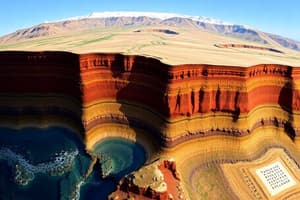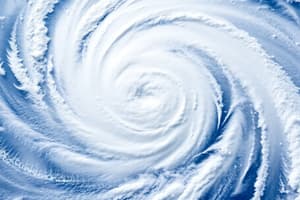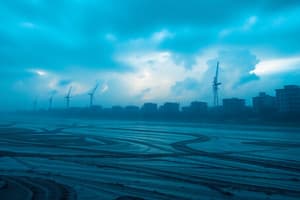Podcast
Questions and Answers
What is the definition of a natural hazard?
What is the definition of a natural hazard?
- A harmless natural occurrence
- A human-made event causing loss of life or property
- An event with the potential to cause loss of life or property, occurring naturally (correct)
- An event caused by the interaction of people and the environment
Which systems provide people with opportunities and constraints?
Which systems provide people with opportunities and constraints?
- The adaptation systems of people
- The communication and global systems
- The geophysical systems in the lithosphere, hydrosphere, atmosphere, and biosphere (correct)
- The social and economic systems
What do people perceive as 'normal events' within the geophysical systems?
What do people perceive as 'normal events' within the geophysical systems?
- Adaptation to natural processes
- Life-threatening events
- Opportunities and resources (correct)
- Extreme events posing danger to human life and possessions
Which of the following best describes ecological hazards?
Which of the following best describes ecological hazards?
What do ecological hazards involve?
What do ecological hazards involve?
What do natural hazards become in the absence of people?
What do natural hazards become in the absence of people?
What is the definition of a natural hazard?
What is the definition of a natural hazard?
What must occur for an event to be classified as a disaster according to the UN's International Strategy for Disaster Reduction?
What must occur for an event to be classified as a disaster according to the UN's International Strategy for Disaster Reduction?
What is the main difference between a hazard and a disaster?
What is the main difference between a hazard and a disaster?
What provides people with opportunities and constraints in the geophysical systems?
What provides people with opportunities and constraints in the geophysical systems?
What is the main difference between tropical storms, floods, landslides, droughts, bushfires, earthquakes, and volcanoes?
What is the main difference between tropical storms, floods, landslides, droughts, bushfires, earthquakes, and volcanoes?
Which natural hazard is most likely to occur in areas between the equator and the tropics of Cancer and Capricorn?
Which natural hazard is most likely to occur in areas between the equator and the tropics of Cancer and Capricorn?
Which natural hazard is responsible for 4500 deaths per year and affected 4.8 million people between 1998 and 2017?
Which natural hazard is responsible for 4500 deaths per year and affected 4.8 million people between 1998 and 2017?
In which type of area are landslides most likely to occur?
In which type of area are landslides most likely to occur?
What is the most frequent natural disaster according to the text?
What is the most frequent natural disaster according to the text?
Which natural hazard is characterized by the sudden movement and shaking on the earth's surface?
Which natural hazard is characterized by the sudden movement and shaking on the earth's surface?
In which region are infectious diseases such as Ebola most predominantly distributed?
In which region are infectious diseases such as Ebola most predominantly distributed?
Where are over 500 active volcanoes in the world mainly concentrated?
Where are over 500 active volcanoes in the world mainly concentrated?
What is the main feature of a bushfire?
What is the main feature of a bushfire?
Where is the ring of fire located, where a significant proportion of the world's largest earthquakes occur?
Where is the ring of fire located, where a significant proportion of the world's largest earthquakes occur?
Flashcards are hidden until you start studying
Study Notes
Natural Hazards and Disasters
- A natural hazard is a natural event or phenomenon that has the potential to cause harm to people and their environment.
Geophysical Systems
- Geophysical systems provide people with opportunities and constraints.
Perceived Normal Events
- People perceive earthquakes, volcanic eruptions, and storms as 'normal events' within the geophysical systems.
Ecological Hazards
- Ecological hazards involve the effects of human activities on the environment, such as pollution, deforestation, and climate change.
- Ecological hazards are the result of human interference with the natural environment.
Natural Hazards vs. Disasters
- In the absence of people, natural hazards are just natural events.
- An event becomes a disaster when it affects human populations and causes harm.
Disaster Classification
- According to the UN's International Strategy for Disaster Reduction, a disaster occurs when a hazard affects a vulnerable population, resulting in damage, loss, and disruption.
Hazards vs. Disasters
- The main difference between a hazard and a disaster is the presence of people and the resulting harm.
Natural Hazards
- Tropical storms, floods, landslides, droughts, bushfires, earthquakes, and volcanoes are all natural hazards.
- Tropical storms are most likely to occur in areas between the equator and the tropics of Cancer and Capricorn.
- Landslides are most likely to occur in areas with steep slopes and heavy rainfall.
- Floods are responsible for 4500 deaths per year and affected 4.8 million people between 1998 and 2017.
- Earthquakes are characterized by the sudden movement and shaking on the earth's surface.
Regional Hazards
- Infectious diseases such as Ebola are most predominantly distributed in tropical regions.
- Over 500 active volcanoes are mainly concentrated in the Pacific Ring of Fire.
- The ring of fire is located around the Pacific Ocean, where a significant proportion of the world's largest earthquakes occur.
Bushfires
- The main feature of a bushfire is the rapid spread of fire through dry vegetation, often fueled by strong winds.
Studying That Suits You
Use AI to generate personalized quizzes and flashcards to suit your learning preferences.




